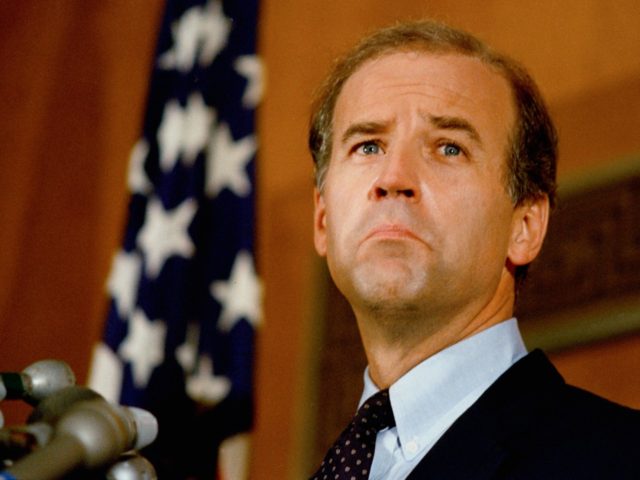Former Vice President Joe Biden exaggerated his involvement in the Civil Rights Movement during his first presidential run.
Biden, who is embroiled in controversy after praising segregationists, repeatedly stressed his civil right activism during a speech in New Hampshire in February 1987. Although portions of his remarks were proven factually inaccurate by the New York Times, few outlets have provided a broader breakdown of the speech, despite it being widely availably on C-SPAN.
Breitbart News has reviewed the full recording and is providing an in-depth report on a number of questionable statements Biden made about civil rights.
At the time of the speech, Biden was 44-years-old and in the midst of his first presidential campaign. Although a member of the U.S. Senate since 1972, Biden did not have a natural constituency in the lead up to the 1988 presidential race. His message focused heavily on changing America’s direction away from the “greed” of the 1980s to something that more resembled the American dream
Biden told the crowd gathered to hear him speak at St. Paul’s School, a private academy in Concord, New Hampshire, America would not be able to address its problems through government alone.
“I want to tell you something,” Biden told the audience. “We are not going to change attitudes in this country by specifically governmental programs. We can make all the right governmental decisions there are and we will only be 40 percent of the way down the road.”
Instead, Biden expressed it was the important the next president focus on changing “attitudes,” much like he did as a young man.
“We have to change attitudes, attitudes about excellence… about ourselves,” Biden continued, “attitudes about community values and community responsibility and attitudes about patriotism that are real, not flag raising.”
“When I marched in the Civil Rights movement, I did not march with a 12-point program,” Biden continued. “I marched with tens of thousands of others to change attitudes, and we changed attitudes.”
Biden’s claim to have marched turned out to be a lie, according to a report this month by the New York Times’ Matt Flegenheimer.
“More than once, advisers had gently reminded Mr. Biden of the problem with this formulation: He had not actually marched during the civil rights movement,” wrote Flegenheimer. “And more than once, Mr. Biden assured them he understood — and kept telling the story anyway.”
The exaggeration, along with Biden’s propensity for plagiarism, would eventually force him to abandon the 1988 race before a single vote was cast.
All of that was in the future, though, and that day in New Hampshire, Biden invoked his “activism” to accuse then-President Ronald Reagan’s administration of turning its back on civil rights.
“I got involved in politics because of civil rights and now I am allegedly the most powerful man in the Senate because I chair the Judiciary Committee, which has control over all civil rights legislation,” Biden said. “Now I’m one of the most powerful men there, in spite of the mounting civil wrongs that are occurring in this country.”
He proceeded to accuse Reagan of being “hellbent” on dismantling civil rights protections, even claiming that by doing so the administration was signaling racism was acceptable.
“I don’t know whether they honestly intended,” Biden said, ” but I think the message that has gone out is one [that says it] is acceptable to have views that even five years ago would be viewed as unacceptable because they had a racist tinge to them.”
Before the country could begin overcoming that message, however, Biden lectured that his fellow “civil rights activists” would need to reckon with the division within their own ranks.
“We who view ourselves as civil rights activists have to stop the politics of division,” Biden said. “It is not black and white—black against white. It is not only blacks that can lead blacks. It is not only whites who lead whites.”
To stress his point, Biden cited Jesse Jackson’s decision in 1986 to support a black primary challenger over a sitting white congressman, the late-Rep. Peter Rodino (D-NJ), in a predominantly minority district.
“It was wrong,” Biden said. “Here’s a man who has a stellar record, the implication was because he’s white he can’t represent a black constituency.
“I think we, who are white, have to understand that we are inadvertently talking that way when we talk about the distinctions based upon race,” he continued. “It does not make sense.”
Jackson, at the time also a candidate for the 1988 Democrat nomination, claimed to have endorsed Rodino’s challenger because he was led to believe the congressman would be retiring. Biden’s criticism mirrored the accusations of “reverse racism” leveled at Jackson over of the endorsement.
The two men had clashed before, most pointedly at the NAACP’s annual convention in July 1986. Biden, who only a few months prior downplayed his stance on civil rights during a visit to Alabama, lectured the African American leaders in attendance that they needed to reject Jackson’s style of politics.
“You must reject the voices in this movement who tell black Americans to go it alone, who tell you that coalitions don’t work anymore… that only black should represent black,” Biden said. He later acknowledged the comments were aimed at Jackson.
The New Hampshire speech comes into the spotlight as Biden scrambles to stabilize his 2020 campaign after praising the “civility” of the late-Sens. James Eastland (D-MS) and Herman Talmadge (D-GA) at a fundraiser in New York City. Both men were avowed segregationists who spent their careers attempting to halt the advancement of civil rights.
Biden has remained defiant in the wake of the controversy, saying he has no reason to apologize.
“There’s not a racist bone in my body,” Biden said when confronted about the comments. “I’ve been involved in civil rights my whole career, period, period, period.”

COMMENTS
Please let us know if you're having issues with commenting.